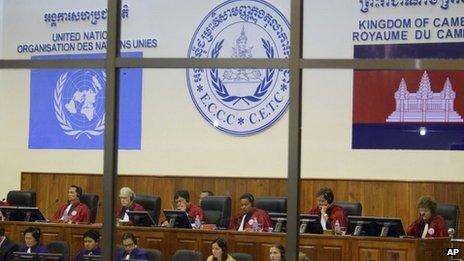Khmer Rouge trial prosecutors seek life terms for leaders
- Published

Prosecutors have asked for the maximum sentence the court can deliver
Prosecutors at the war crimes tribunal in Cambodia have called for the maximum sentence of life imprisonment for the Khmer Rouge's two most senior surviving leaders.
Nuon Chea, 87, and Khieu Samphan, 82, are charged with crimes against humanity for their roles in the regime which ruled from 1975-1979.
The court is expected to deliver verdicts early next year.
It is believed that up to two million people died under the Khmer Rouge.
The court started hearing closing statements last week, in what officials say is "the final milestone" in the trial.
Prosecutor Chea Leang wrapped up the prosecution's closing arguments on Monday by calling for the maximum sentence the court can deliver.
"On behalf of the Cambodian people and the international community we ask you for justice - justice for the victims who perished and justice for the victims who survived today who had to live through such a vicious and cruel regime under the leadership of these two accused and other leaders," she was quoted as saying by the Agence-France Presse news agency.
She was also quoted by the Associated Press as saying that the two men had shown little remorse.
Both Nuon Chea, the regime's number two leader, and Khieu Samphan, its head of state, have said in the past that they believed they were acting in the best interests of the nation and had been unaware of the full extent of killings.
Two other people also faced charges along with Nuon Chea and Khieu Samphan.
But Ieng Thirith, 80, formerly the social affairs minister, was released after the tribunal ruled that she was unfit to stand trial due to illness.
Her husband, former senior Khmer Rouge leader Ieng Sary, who served as the regime's foreign minister, died while on trial at the age of 87.
Khmer Rouge leader Pol Pot died in 1998.
The tribunal, established in 2006, has sentenced only one defendant so far. Chief jailer Kaing Guek Eav, known as Duch, was sentenced to life imprisonment for his role in running the notorious Tuol Sleng prison, where thousands of inmates were killed.
The tribunal has run into problems, including court workers going on strike over unpaid wages in September.
Rights groups and campaigners have criticised the pace of the trial and voiced fears that the age of its remaining two defendants may mean that justice is not served.
- Published16 October 2013
- Published31 May 2013
- Published2 September 2013
- Published14 March 2013
- Published21 November 2011
- Published23 November 2011
- Published16 September 2012